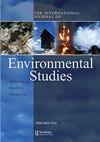农药在印度喀拉拉邦芒果果园的定量、分布和致癌风险评估
International Journal of Environmental Studies
Pub Date : 2023-10-02
DOI:10.1080/00207233.2023.2261271
引用次数: 0
摘要
【摘要】近三十年来,西高止山脉的穆塔拉马达一直是亚洲重要的芒果种植区。本研究分析了Muthalamada芒果果园土壤样品的农药含量,并估算了相关的癌症风险指数。在该地区检测到16种农药,包括有机氯、有机磷、合成拟除虫菊酯和氨基甲酸酯。毒死蜱的浓度(2.05-720.27 mg/kg)是印度所有农业生态系统中报告的最高水平。社区健康风险评估显示,儿童的致癌风险高,易感程度高。这项研究表明,需要立即采取干预措施,以减少芒果果园的生态和人类癌症风险。关键词:农药、土壤、致癌物质、微生物、健康风险。我们要感谢Muthalamada Panchayat的所有农民的合作。此外,我们要感谢印度喀拉拉邦科钦的Seal Lab实验室对农药的分析。披露声明作者未报告潜在的利益冲突。补充材料本文的补充数据可在https://doi.org/10.1080/00207233.2023.2261271上在线获取。本文章由计算机程序翻译,如有差异,请以英文原文为准。
Quantification, distribution and cancer risk assessment of pesticides in mango orchards of Kerala, India
ABSTRACTMuthalamada in the Western Ghats has been a prominent mango-cultivating region of Asia for the last three decades. In the present study, soil samples from Muthalamada mango orchards were analysed for pesticide contents and estimated associated cancer risk indices. Sixteen pesticides, including organochlorines, organophosphates, synthetic pyrethroids, and carbamates were detected in the region. The concentration of chlorpyrifos (2.05–720.27 mg/kg) was the highest level reported from any agroecosystem in India. Community health risk assessment indicates high carcinogenic risk and greater susceptibility in children. The study demonstrates the need for immediate interventions to reduce the ecological and human cancer risks in the mango orchards.KEYWORDS: PesticidesoilcarcinogenMuthalamada: health risk AcknowledgmentsThis research was funded by Kerala state E-grantz fellowship. We would like to thank all the farmers in Muthalamada Panchayat for their collaboration. In addition, we would like to thank Seal Lab laboratories, Kochi, Kerala, India for the analysis of pesticides.Disclosure statementNo potential conflict of interest was reported by the author(s).Supplementary materialSupplemental data for this article can be accessed online at https://doi.org/10.1080/00207233.2023.2261271.
求助全文
通过发布文献求助,成功后即可免费获取论文全文。
去求助
来源期刊

International Journal of Environmental Studies
Social Sciences-Geography, Planning and Development
CiteScore
3.30
自引率
0.00%
发文量
121
期刊介绍:
For more than 45 years, the International Journal of Environmental Studies has been pre-eminent in its field. The environment is understood to comprise the natural and the man-made, and their interactions; including such matters as pollution, health effects, analytical methods, political approaches, social impacts etc. Papers favouring an interdisciplinary approach are preferred, because the evidence of more than 45 years appears to be that many intellectual tools and many causes and effects are at issue in any environmental problem - and its solution. This does not mean that a single focus or a narrow view is unwelcome; provided always that the evidence is indicated and the method is robust. Pragmatic decision-making and applicable policies are subjects of interest, together with the problems in establishing facts about dynamic systems where long periods of observation and precise measurement may be difficult to secure. In other words, a systems or holistic approach to the environment and a scientific analysis are complementary, and the distinction between ’hard’ and ’soft’ science is bridged in most of the papers published. These may be on any item in the agenda of environmental science: land, water, food, conservation, population, risk analysis, energy, economics of ecological and non-ecological approaches, social advocacy of arguments for change, legal measures, implications of urbanism, energy choices, waste disposal, recycling, transport systems and other issues of mass society. There is concern also for marginal areas, under-developed societies, minorities, species loss; and indeed no element of the subject of environmental studies, seen in an international and interactive mode, is excluded.
 求助内容:
求助内容: 应助结果提醒方式:
应助结果提醒方式:


